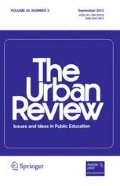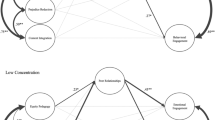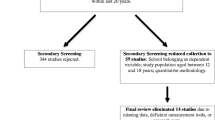Abstract
Research has sought to understand how parents socialize their children around race and ethnicity, but few studies have considered how contexts outside the home are also important sources of socialization. In this paper we review and integrate literature on practices in school settings that have implications for ethnic–racial socialization using a framework based on Hughes et al. (Dev Psychol 42(5):747–770, 2006) review of parental socialization. The practices reviewed include cultural socialization, preparation for bias, promotion of mistrust, egalitarianism, colorblindness, and silence. Our review shows a wide range of practices in education that may influence the development of ethnic–racial identity and ethnic–racial consciousness, but more research is needed to understand the role that schools play in developing African American youth’s understanding of race and identity.
Similar content being viewed by others
References
Aboud, F. E., & Fenwick, V. (1999). Exploring and evaluating school-based interventions to reduce prejudice. Journal of Social Issues, 55(4), 767–785.
Aboud, F. E., & Levy, S. R. (2000). Interventions to reduce prejudice and discrimination in children and adolescents. In S. Oskamp (Ed.), Reducing prejudice and discrimination. Mahwah, NJ: Lawrence Erlbaum.
Aldana, A., Rowley, S. J., Checkoway, B., & Richards-Schuster, K. (2012). Raising ethnic–racial consciousness: The relationship between intergroup dialogues and adolescents’ ethnic–racial identity and racism awareness. Equity & Excellence in Education, 45(1), 120–137. doi:10.1080/10665684.2012.641863.
Arunkumar, R., Midgley, C., & Urdan, T. (1999). Perceiving high or low home-school dissonance: Longitudinal effects on adolescent emotional and academic well-being. Journal of Research on Adolescence, 9(4), 441–466. doi:10.1207/s15327795jra0904_4.
Asante, M. K. (1991). The Afrocentric idea in education. The Journal of Negro Education, 60(2), 170–180. doi:10.2307/2295608.
Banks, J. A. (1992). Insights on diversity: Dimensions of multicultural education. Kappa Delta Pi Record, 29(1), 12.
Banks, J. A. (1993). Multicultural education: Historical development, dimensions, and practice. Review of Research in Education, 19, 3–49.
Banks, J. A. (2007). Educating citizens in a multicultural society (2nd ed.). New York, NY: Teachers College Press.
Bennett, C. (2001). Genres of research in multicultural education. Review of Educational Research, 71(2), 171–217.
Bowman, P. J., & Howard, C. (1985). Race-related socialization, motivation, and academic achievement: A study of Black youths in three-generation families. Journal of the American Academy of Child Psychiatry, 24(2), 134–141.
Boykin, A. W., Tyler, K. M., Watkins-Lewis, K., & Kizzie, K. (2006). Culture in the sanctioned classroom practices of elementary school teachers serving low-income African American students. Journal of Education for Students Placed at Risk, 11(2), 161–173.
Bronfenbrenner, U., & Morris, P. (2006). The bioecological model of human development. In R. Lerner & W. Damon (Eds.), Handbook of child psychology: Theoretical models of human development (6th ed.). Hoboken, NJ: Wiley.
Brown-Willis, D. (2012). Employing an African diaspora lens: A review of Afrocentric education in the United States (1980–2000). Institute for the Study of the African American Child Bi-Annual Empirical Conference of Research on African American Education. https://isaac.wayne.edu/cord/article.php?newsletter=245&article=3775.
Brozo, W. G., Valerio, P. C., & Salazar, M. M. (1996). A walk through Gracie’s garden: Literacy and cultural explorations in a Mexican American junior high school. Journal of Adolescent & Adult Literacy, 40(3), 164–170.
Cammarota, J., & Fine, M. (2008). Revolutionizing education: Youth participatory action research in motion. New York, NY: Routledge.
Carter, R. (2000). Reimagining race in education: A new paradigm from psychology. The Teachers College Record, 102(5), 864–897.
Checkoway, B., Figueroa, L., & Richards-Schuster, K. (2003). Democracy multiplied in an urban neighborhood: Youth force in the South Bronx. Children, Youth and Environments, 13, 1–19.
Chow-Hoy, T. K. (2001). An inquiry into school context and the teaching of the virtues. Journal of Curriculum Studies, 33(6), 655–682. doi:10.1080/00220270110056590.
Clarkson, L. M. C., & Johnstone, J. R. (2011). When the African-centered paradigm is not enough: Lessons from an urban charter school. The Journal of Negro Education, 80(2), 108–120.
Conchas, G. Q. (2001). Structuring failure and success: Understanding the variability in Latino school engagement. Harvard Educational Review, 71(3), 475–505.
Conchas, G. Q. (2006). The color of success: Race and high-achieving urban youth. New York, NY: Teachers College Press.
Conger, D. (2005). Within-school segregation in an urban school district. Educational Evaluation and Policy Analysis, 27(3), 225–244.
Cross, W. E., & Cross, T. B. (2008). Theory, research, and models. In S. M. Quintana & C. McKown (Eds.), Handbook of race, racism, and the developing child. New York: Wiley.
Demo, D. H., & Hughes, M. (1990). Socialization and racial identity among Black Americans. Social Psychology Quarterly, 53(4), 364–374.
Dessel, A., Rogge, M. E., & Garlington, S. B. (2006). Using intergroup dialogue to promote social justice and change. Social Work, 51, 303–315.
Duarte, E. M. (1998). Expanding the borders of liberal democracy: Multicultural education and the struggle for cultural identity. Educational Foundations, 12(2), 5–30.
Ferguson, A. A. (2001). Bad boys: Public schools in the making of black masculinity. Ann Arbor: University of Michigan Press.
Ghee, K., Walker, J., & Younger, A. (1998). The Raamus academy. Journal of Prevention & Intervention in the Community, 16, 87–102.
Ginwright, S. A. (2000). Identity for sale: The limits of racial reform in urban schools. The Urban Review, 32, 87–104.
Grant, C. A. (1994). Challenging the myths about multicultural education. Multicultural Education, 2(2), 4–9.
Hallinan, M. T. (1998). Diversity effects on student outcomes: Social science evidence. Ohio St. LJ, 59, 733.
Hallinan, M. T., & Teixeira, R. A. (1987). Students’ interracial friendships: Individual characteristics, structural effects, and racial differences. American Journal of Education, 95(4), 53–583.
Hallinan, M. T., & Williams, R. A. (1989). Interracial friendship choices in secondary schools. American Sociological Review, 1, 67–78.
Hamm, J. V. (2001). Barriers and bridges to positive cross-ethnic relations. Youth & Society, 33(1), 62–98. doi:10.1177/0044118X01033001003.
Howard, T. C. (2001). Telling their side of the story: African-American students’ perceptions of culturally relevant teaching. The Urban Review, 33(2), 131–149.
Hughes, D., & Chen, L. (1999). The nature of parents’ race-related communications to children: A developmental perspective. In L. Balter & C. S. Tamis-LeMonda (Eds.), Child psychology: A handbook of contemporary issues (pp. 467–490). Philadelphia, PA: Taylor & Francis.
Hughes, D., & DuMont, K. (1993). Using focus groups to facilitate culturally anchored research. American Journal of Community Psychology, 21(6), 775–806.
Hughes, D. L., McGill, R. K., Ford, K. R., & Tubbs, C. (2011). Black youths’ academic success: The contribution of racial socialization from parents, peers, and schools. In N. E. Hill, T. L. Mann, & H. E. Fitzgerald (Eds.), African American children and mental health Vols. 1 and 2: Development and context, prevention and social policy (Vol. 1, pp. 95–124). Santa Barbara, CA: Praeger/ABC-CLIO.
Hughes, D., Rodriguez, J., Smith, E. P., Johnson, D. J., Stevenson, H. C., & Spicer, P. (2006). Parents’ ethnic–racial socialization practices: A review of research and directions for future study. Developmental Psychology, 42(5), 747–770.
Hughey, M. W. (2010). The (dis) similarities of white racial identities: The conceptual framework of “hegemonic whiteness”. Ethnic and Racial Studies, 33(8), 1289–1309.
Juang, L., & Syed, M. (2010). Family cultural socialization practices and ethnic identity in college-going emerging adults. Journal of Adolescence, 33(3), 347–354. doi:10.1016/j.adolescence.2009.11.008.
Knight, G. P., Bernal, M. E., Cota, M. K., Garza, C. A., & Ocampo, K. A. (1993). Family socialization and Mexican American identity and behavior. In M. E. Bernal & G. P. Knight (Eds.), Ethnic identity: Formation and transmission among hispanics and other minorities (pp. 105–129). Albany: State University of New York Press.
Ladson-Billings, G., & Tate, W., IV. (1995). Toward a critical race theory of education. The Teachers College Record, 97(1), 47–68.
Lewis, A. E. (2003). Race in the schoolyard: Negotiating the color line in classrooms and communities. New Brunswick, NJ: Rutgers University Press.
Lewis, K. M., Andrews, E., Gaska, K., Sullivan, C., Bybee, D., & Ellick, K. L. (2012). Experimentally evaluating the impact of a school-based African-centered emancipatory intervention on the ethnic identity of African American adolescents. Journal of Black Psychology, 38(3), 259–289. doi:10.1177/0095798411416458.
Loewen, J. (1995). By the book: Who’s to blame for the sorry state of history textbooks? American School Book Journal, 182, 24–27.
Loewen, J. W., Keeler, B., & Findaway World, L. L. C. (2007). Lies my teacher told me: Everything your american history textbook got wrong (2nd ed.). New York, NY: Simon & Schuster.
Manning, M. L. (1999). Developmentally responsive multicultural education for young adolescents. Childhood Education, 72(2), 82–87.
Miller, A. N., & Fellows, K. L. (2007). Negotiating white racial identity in multicultural courses: A model. In L. M. Cooks & J. S. Simpson (Eds.), Whiteness, pedagogy, performance: Dis/placing race (pp. 49–66). Lanham, MD: Lexington Books/Rowman & Littlefield.
Milner, H. R. (2005). Developing a multicultural curriculum in a predominantly White teaching context: Lessons from an African American teacher in a suburban English classroom. Curriculum Inquiry, 35(4), 391–427.
Moody, J. (2001). Race, school integration, and friendship segregation in America. American Journal of Sociology, 107(3), 679–716. doi:10.1086/338954.
Morrison, K. A., Robbins, H. H., & Rose, D. G. (2008). Operationalizing culturally relevant pedagogy: A synthesis of classroom-based research. Equity & Excellence in Education, 41, 433–452.
Nagda, B. R., McCoy, M. L., & Barrett, M. H. (2006). Mix it up: Crossing social boundaries as a pathway to youth civic engagement. National Civic Review, 95(1), 47–56.
Oakes, J. (2005). Keeping track: How schools structure inequality. New Haven, CT: Yale University Press.
Orfield, G. (2001). Schools more separate: Consequences of a decade of resegregation. Cambridge, MA: The Civil Rights Project, Harvard University.
Perry, P. (2001). White means never having to say you’re ethnic. Journal of Contemporary Ethnography, 30(1), 56–91.
Peters, M. F. (2002). Racial socialization of young Black children. In H. P. McAdoo (Ed.), Black children: Social, educational, and parental environments (2nd ed., pp. 57–72). Thousand Oaks, CA: Sage.
Phinney, J. S., Ferguson, D. L., & Tate, J. D. (1997). Intergroup attitudes among ethnic minority adolescents: A causal model. Child Development, 68(5), 955–969.
Powers, K. M. (2006). An exploratory study of cultural identity and culture-based educational programs for urban American Indian students. Urban Education, 41(1), 20–49.
Quintana, S. M. (2007). Racial and ethnic identity: Developmental perspectives and research. Journal of Counseling Psychology, 54(3), 259–270.
Quintana, S. M., & Vera, E. M. (1999). Mexican American children’s ethnic identity, understanding of ethnic prejudice, and parental ethnic socialization. Hispanic Journal of Behavioral Sciences, 21(4), 387–404.
Rezai-Rashti, G. (1995). Multicultural education, anti-racist education, and critical pedagogy: Reflections on everyday practice. In R. Ng, P. A. Staton, & J. Scane (Eds.), Anti-Racism, feminism, and critical approaches to education (pp. 3–19). Santa Barbara: Greenwood Publishing Group.
Rios, V. M. (2011). Punished: Policing the lives of Black and Latino boys. New York: NYU Press.
Sleeter, C. E. (2011). The academic and social value of ethnic studies: A research review. Washington, DC: National Education Association.
Sleeter, C. E., & Grant, C. A. (2011). Making choices for multicultural education: Five approaches to race, class and gender (6th ed.). Hoboken, NJ: Wiley.
Sleeter, C. E., & McLaren, P. (1995). Multicultural education, critical pedagogy, and the politics of difference. Albany, NY: State University of New York Press.
Spencer, M. S., Brown, M., Griffin, S., & Abdullah, S. (2008). Outcome evaluation of the intergroup project. Small Group Research, 39(1), 82–103.
Spencer, M. B., & Markstrom-Adams, C. (1990). Identity processes among racial and ethnic minority children in America. Child Development, 61(2), 290–310.
Stangor, C., & Schaller, M. (2000). Stereotypes as individual and collective representations. In C. Stangor (Ed.), Stereotypes and prejudice: Essential readings (pp. 64–82). Philadelphia: Psychology Press.
Stevenson, H. C. (1994). Validation of the scale of racial socialization for African American adolescents: Steps toward multidimensionality. Journal of Black Psychology, 20(4), 445–468.
Stevenson, H. C. (1995). Relationship of adolescent perceptions of racial socialization to racial identity. Journal of Black Psychology, 21(1), 49–70.
Strange, D. P. (2009). A case study of the implementation of a customized multicultural science program in an Urban High School. Unpublished Thesis.
Tatum, B. (1994). Teaching white students about racism: The search for white allies and the restoration of hope. The Teachers College Record, 95(4), 462–476.
Tatum, B. D. (1997). “Why are all the black kids sitting together in the cafeteria?” And other conversations about race. New York, NY: Basic Books.
Tatum, B. D. (2004). Family life and school experience: Factors in the racial identity development of Black youth in White communities. Journal of Social Issues, 60(1), 117–135.
Thomas, O., Davidson, W., & McAdoo, H. (2008). An evaluation study of the Young Empowered Sisters (YES!) program: Promoting cultural assets among African American adolescent girls through a culturally relevant school-based intervention. Journal of Black Psychology, 34(3), 281–308. doi:10.1177/0095798408314136.
Thornton, M. C., Chatters, L. M., Taylor, R. J., & Allen, W. R. (1990). Sociodemographic and environmental correlates of racial socialization by Black parents. Child Development, 61, 401–409.
Torre, M. E. (2009). Participatory action research and critical race theory: Fueling spaces for nos-otras to research. The Urban Review, 41(1), 106–120. doi:10.1007/s11256-008-0097-7.
Tyson, K., Darity, W., & Castellino, D. R. (2005). It’s not “a black thing”: Understanding the burden of acting white and other dilemmas of high achievement. American Sociological Review, 70, 582–605.
Zirkel, S. (2008). The influence of multicultural educational practices on student outcomes and intergroup relations. The Teachers College, 110(6), 1147–1181.
Author information
Authors and Affiliations
Corresponding author
Rights and permissions
About this article
Cite this article
Aldana, A., Byrd, C.M. School Ethnic–Racial Socialization: Learning About Race and Ethnicity Among African American Students. Urban Rev 47, 563–576 (2015). https://doi.org/10.1007/s11256-014-0319-0
Published:
Issue Date:
DOI: https://doi.org/10.1007/s11256-014-0319-0




